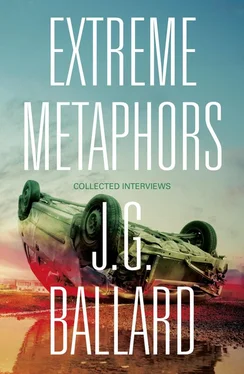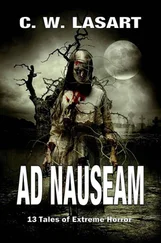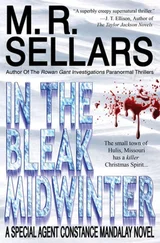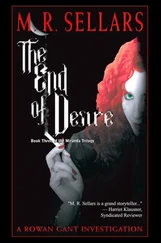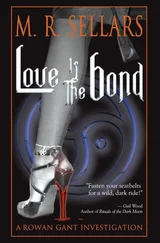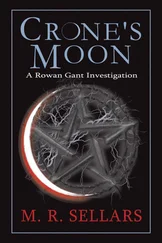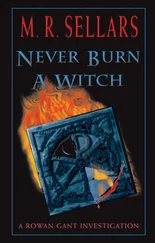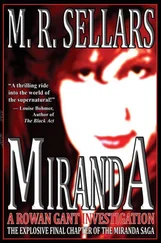BALLARD:Some films. The Savage Eye had a tremendous impact on me because it presented a completely fragmented and quantified narrative through which the heroine evolved her own identity. Most films, though, are still made in linear terms, and I find that painters, perhaps because a painting is a single image, are much more stimulating; they corroborate my own preoccupations much more.
MACBETH:Yes, indeed; it seems very much that your central preoccupation is, in the very loosest sense, with time and the absence of time, with a massive kind of stasis that embodies a sense of time moving. However, there are a number of difficulties here. I think that particularly this seems to lead you towards the special kind of density I’ve mentioned, and that, in a way, leads to the stories working perhaps rather more like poetry than like prose; they have overtones, associations and resonances. And I think most readers are likely to find them literally very difficult.
BALLARD:I think that’s simply the inertia of convention. If you could scrap all retrospective fiction and its immense body of conventions, most people who, for example, find William Burroughs’ narrative techniques almost impossible to recognise – in exactly the same way that some aboriginal tribesmen are supposed to be unable to recognise their own photographs – would realise that Burroughs’ narrative techniques, or my own in their way, would be an immediately recognisable reflection of the way life is actually experienced. We live in quantified non-linear terms – we switch on television sets, switch them off half an hour later, speak on the telephone, read magazines, dream and so forth. We don’t live our lives in linear terms in the sense that the Victorians did.
MACBETH:I can understand that, but I think it’s slightly more complicated than that, in that the reader has to move at quite a different speed through these stories; he has to pause, he has to reread, he perhaps even doesn’t have to start at the beginning and go to the end, he may want to shift about to get a bigger concentration on certain key sections; he also, almost certainly I think, has to work with a number of reference books available, because there are in all of these later stories words that certainly I didn’t know the meaning of at first and I would want to look up. At the same time, interestingly enough, you are publishing in science fiction magazines, which contain material that in terms of structure and content are obviously much simpler. I wonder really how far the audience you’re getting is naturally equipped to treat these stories in the right way. Does this worry you?
BALLARD:No, I think the science fiction readership, if there is such a readership, is much more sophisticated than one might imagine, far more sophisticated probably than the general readership of conventional fiction. These devices which I use are not as outrageous as they seem; they don’t in fact dislocate the elements of the narrative to anything like the extent they appear to do at first glance at the page.
MACBETH:Yes, I can see that, and historically speaking I can also see that your earlier stories do seem to be preoccupied with certain similar themes, though in a much less dense and exciting way. This theme of time emerges in a number of much more straightforward stories; the story of yours called ‘The Time Tombs’, for example, which does again have this thing about sand in it. Now the turning point, it seemed to me, was a story of yours called ‘The Terminal Beach’, which seemed to be midway between your older stories and your new ones.
BALLARD:Yes, there I made my first attempt at a narrative in which the events of the story were quantified in the sense that they were isolated from the remainder of the narrative and then examined from a number of angles.
MACBETH:The stories you’ve written which we’ve been talking about are those such as ‘You and Me and the Continuum’, The Atrocity Exhibition , ‘You: Coma: Marilyn Monroe’ and ‘The Assassination Weapon’. In fact, it sometimes seems, as I’ve read these, that one could almost translate bits of one into bits of the other. They seem, in a certain sense, not four independent stories, but four fragments of a kind of sequence. Are you aware of them relating, and do you have in your mind further ones which you will write, such that, taken as a group, they will shed extra light on each other?
BALLARD:I think they’re all chapters in a much longer narrative that is evolving at its pace. I don’t think it’s evolving in a sequential sense, in the sense that the events of, say, Moby-Dick evolve one after another; they’re evolving in an apparently random sense, but all the images relate to one another, and I hope when more stories have been written they will reinforce one another and produce something larger than the sum of their parts.
MACBETH:Despite what you said about the science fiction audience, I suppose you wouldn’t think of yourself as a writer of science fiction; you’d think of yourself as just a writer, presumably.
BALLARD:I don’t regard myself as a writer of what most people would call modern science fiction, which is predominantly American, even though much of it has been written by English writers. Modern American science fiction grew out of magazines such as the Popular Mechanics of the thirties; it’s an extrovert, optimistic literature of technology. I think the new science fiction, which other people apart from myself are now beginning to write, is introverted, possibly pessimistic rather than optimistic, much less certain of its own territory. There’s a tremendous confidence that radiates through all modern American science fiction of the period 1930 to 1960; the certainty that science and technology can solve all problems. This is not the dominant form of science fiction now. I think science fiction is becoming something much more speculative, much less convinced about the magic of science and the moral authority of science. There’s far more caution on the part of the new writers than there was.
1968: Uncredited. Munich Round Up – Interview with J.G. Ballard
Originally published in German as ‘Interview mit J.G. Ballard’ (uncredited), Munich Round Up 100, 1968. Translated by Dan O’Hara
Early in 1968, Bavarian TV ran a four-part educational series on science fiction, the third episode of which featured excerpts from an interview with Ballard. The footage of this episode is no longer available, and is presumably now lost. Like so much valuable TV footage of that era, it was probably shot on tape which, owing to its expense, was reused, thereby erasing the interview. Later that year the director of the series, Brian Wood, published a translation of a full transcript of the interview in a German-language science fiction fanzine called Munich Round Up . The ’zine also contained ‘Notiz aus dem Nirgendwo’, a German translation of Ballard’s 1966 piece ‘Notes from Nowhere’.
Although I have retranslated this interview into English, inevitably such a process is unsatisfactory – after all, one must read Ballard’s words through the lens of another language. Yet it is striking just how difficult it is to strip Ballard’s words of their distinctive character, and very little of his meaning is lost in translation. It seems likely that this 1968 interview is in fact a transcript of the German subtitles used in the TV programme, as the interview here contains no questions. I have therefore chosen to translate back into English as literally as possible, preserving some of the odder and more interesting artefacts produced by the original translator, Gary Klüpfel. One of the most obvious of these is Ballard’s assertion that he uses the diamond (‘Diamant’) as a symbol of timeless structure in The Crystal World . Clearly the original translator decided that Ballard intended a more conventional symbol of eternity. [DOH]
Читать дальше
